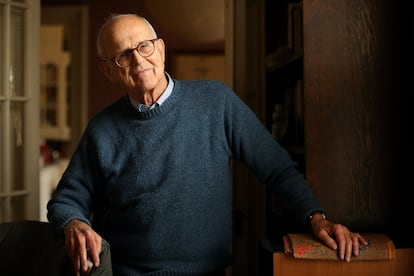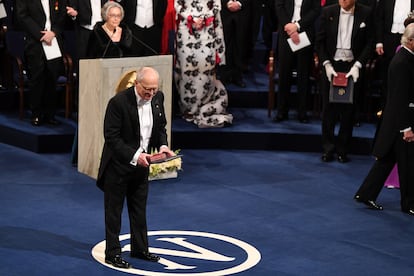Physicist and Nobel Prize winner Rainer Weiss, a pioneer in the detection of gravitational waves, dies.


Rainer Weiss, the German-born American physicist who won the Nobel Prize in Physics and the Princess of Asturias Award for Technical and Scientific Research in 2017 , has died at the age of 92, the Princess of Asturias Foundation confirmed.
The jury agreed to award him, along with Kip Thorne, Barry Barish, and the LIGO Scientific Collaboration, the prize for " the direct detection of gravitational waves , ripples in space-time anticipated by Albert Einstein in his Theory of General Relativity a century ago." This milestone, according to the jury's minutes at the time, constitutes "one of the most important challenges in the history of physics."
The award recognized both the individual talent and the collective work of more than 1,000 researchers from 100 institutions in 18 countries. The LIGO project represented a technological challenge of the first magnitude: the extraordinary precision achieved by its instruments made it possible to observe collisions of very massive black holes that occurred more than a billion years ago.

Rainer Weiss was born in Berlin in 1932 and emigrated to the United States as a child, fleeing Nazism. He studied at the Massachusetts Institute of Technology (MIT), where he was professor emeritus.
A specialist in experimental physics, his research ranged from cosmic background radiation to gravitational wave detectors . In the mid-1970s, he was one of the first to conceive a design based on laser interferometry to capture these waves, which at the time were only a theoretical prediction.
His work was key to the creation of LIGO (Laser Interferometer Gravitational-Wave Observatory), the major project that, in 2015, managed to detect gravitational waves for the first time, confirming one of Einstein's boldest predictions and opening a new era for astronomy.
In 2017, he received the Nobel Prize in Physics, along with Thorne and Barish, "for their decisive contributions to the LIGO detector and the observation of gravitational waves." In addition to the Nobel Prize and the Princess of Asturias Award, he has also received numerous international recognitions.
Do you want to add another user to your subscription?
If you continue reading on this device, it will not be possible to read it on the other device.
ArrowIf you want to share your account, upgrade to Premium, so you can add another user. Each user will log in with their own email address, allowing you to personalize your experience with EL PAÍS.
Do you have a business subscription? Click here to purchase more accounts.
If you don't know who's using your account, we recommend changing your password here.
If you decide to continue sharing your account, this message will be displayed indefinitely on your device and the device of the other person using your account, affecting your reading experience. You can view the terms and conditions of the digital subscription here.
EL PAÍS





